Text
I found this really important tiktok about what to do if a Jehovah's Witness or Morman missionary comes to your door:
143K notes
·
View notes
Text
okay but I feel this needs to be said:
wlw who grew up in religiously homophobic environments are strong and powerful. wlw who went to religious schools where homophobia was in the curriculum, wlw who grew up hearing things like “hate the sin, not the sinner,” “marriage is exclusively between a man and a woman because god said so,” and even people comparing homosexuality with pedophelia and beastiality, wlw who were told at home that they had to save themselves for their ~husband~. Even if after you left that environment you stuck with your religion or left it because you felt you didn’t belong, y’all are so very valid and strong and amazing, and you deserve all the love.
14K notes
·
View notes
Text
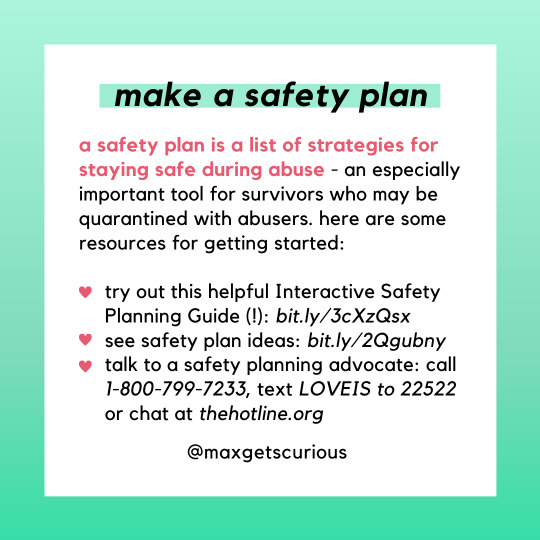

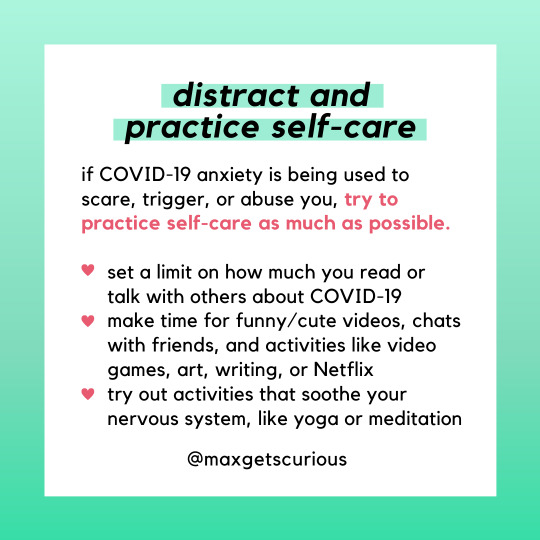
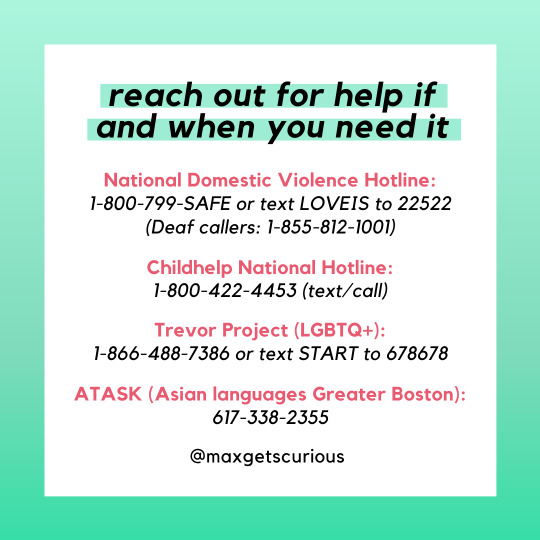
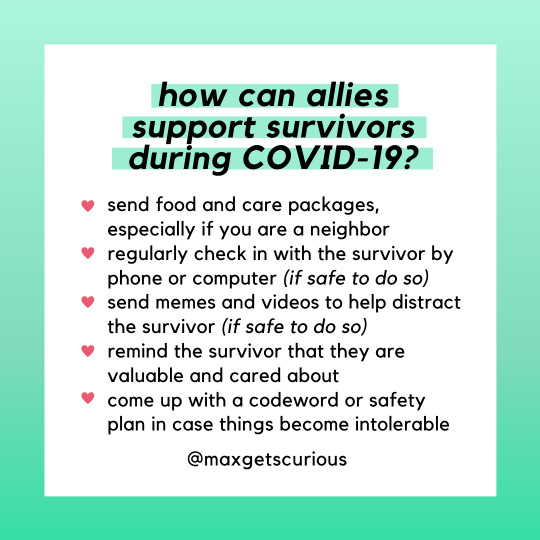
Thinking of you all — sincerely, a fellow survivor. You will get through this. 💌🤍💜
404 notes
·
View notes
Note
When I first looked up religious abuse the sources at the top of google were all about it being within a religious organization and not within a family, but mine some years back was definitely 80% my already identified as emotionally abusive dad. I think maaybe this is clearer now with eg Tara Westover's Educated but I want people to know that religious abuse can take place within a family, especially if someone assumes the role of spiritual leader.
(cont) and yes, Max has done a good job of mentioning that and linking to resources that include familial or domestic spiritual abuse, I just want to be emphatic about that because it can be hard to name abuse and if someone has looked it up before and written it off based on such sources, they (or indeed me thanks to past resources) might skim over the posts thinking oh, well, it's not that. when it is.
Hey! All the posts I’ve written so far about spiritual abuse are actually specifically about domestic spiritual abuse, aka within families or partnerships. I don’t write about spiritual abuse in organizations because that’s not my experience, and like you, I also know that a lot of people assume spiritual abuse means abuse by leaders. That’s actually the reason why I didn’t believe I was an abuse survivor or truly suffered from trauma for years after I escaped up until this year, when I learned that spiritual abuse can happen at home. I decided to start writing about domestic spiritual abuse so others wouldn’t go through what I have in terms of denial, confusion and invalidation.
I appreciate you saying this and will take it as a sign that I’m not being clear enough that I’m specifically talking about domestic spiritual abuse (though I mentioned that in my first post about what spiritual abuse is, not sure if you saw.) I’m probably going to be writing more in depth about domestic SA in the future so I’ll keep that in mind ☺️
16 notes
·
View notes
Text
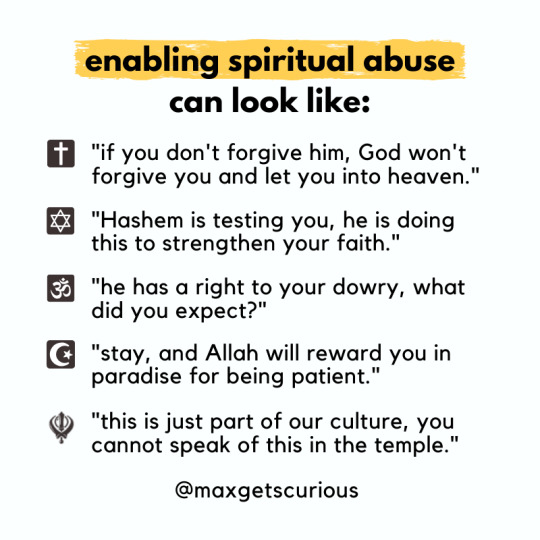
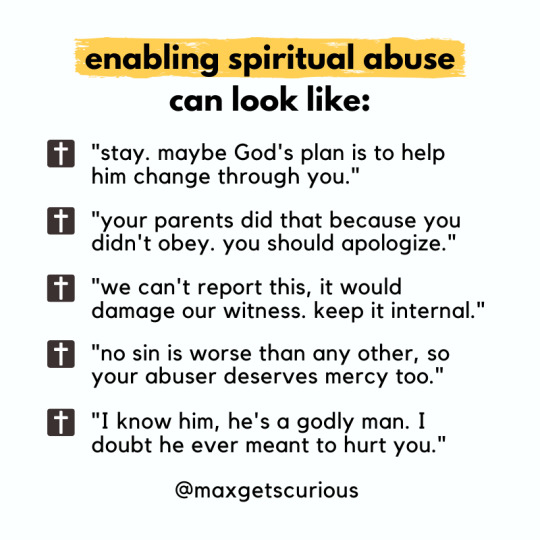
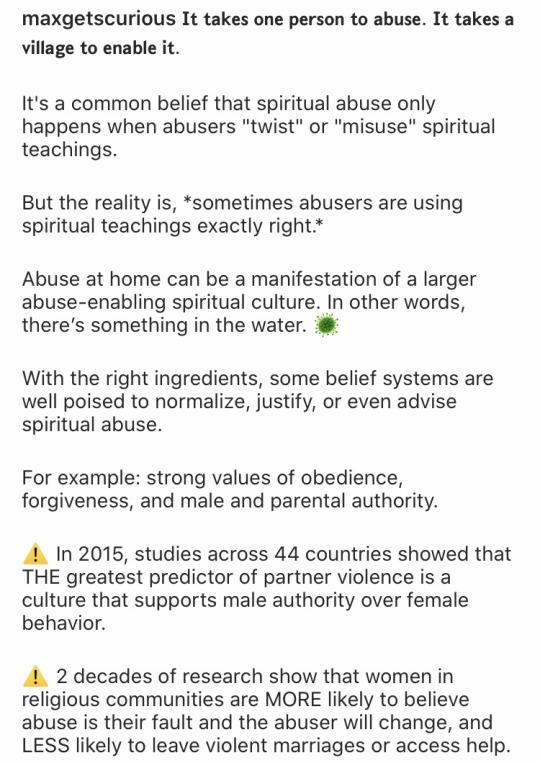

Spiritual abuse happens when abuse — a pattern of behavior used by one person to gain power and control over another — is justified, camouflaged, or perpetrated through spiritual teachings.
Abuse does NOT have to be intentional to still be valid, to still hurt and to still deserve accountability and change.
If you’re experiencing abuse at home, and spiritual leaders or fellow believers are overlooking, silencing, justifying, blaming you for, or telling you to “just endure” your abuse — please know this is not your fault. You deserve better. And you do not have to stay. ❤️🧡💛
537 notes
·
View notes
Text
spiritual abuse resource post
What is spiritual abuse?
We as a society are slowly getting better at naming and talking about abuse. But what if abuse is done by family members or partners who say they’re trying to save our souls?
There’s actually a name for that: spiritual abuse.
Abuse is a pattern of behavior used by one person to gain and maintain power and control over another in ways that hurt, whether intentional or not.
Spiritual abuse, simply put, is abuse that is perpetrated through spirituality.
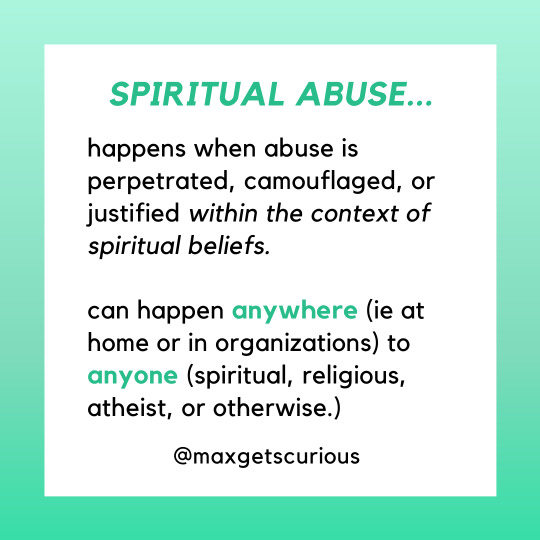
What can spiritual abuse look like?
“He says he follows the Quran when he hits me and won’t let me go out until I make dua. If I stopped wearing hijab I don’t know what he’d do.”
"She justifies her control of me by saying ‘children, obey your parents in everything.’ She withholds college tuition and rides to work if I don’t participate enough in church.”
“They won’t let me get vaccinated because they only believe in energy healing. When I try to talk about how they hurt me, they just say I attract what I deserve.”
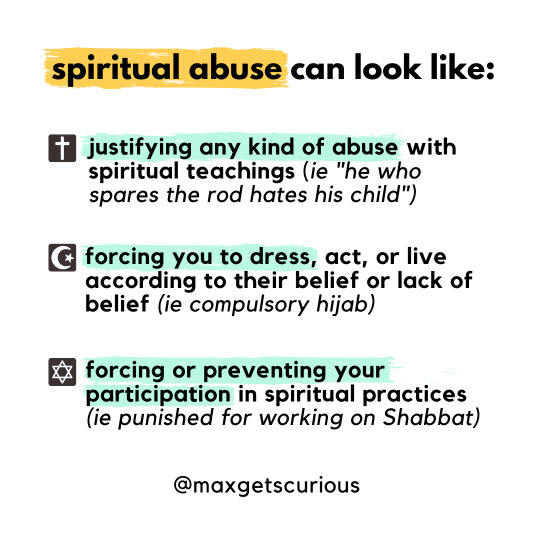

Spiritual abuse at home may be one of the most widespread forms of abuse out there, but it’s so often camouflaged, justified, or overlooked because of the taboo of spirituality (especially at home) as a “private matter.”
But here’s the truth: When we name it, we can finally start to heal from it and compel abusers to change. 🗝
Abuse in the name of God (or gods, morals, vibes, etc.) is still abuse. We need to talk more about it. I’m writing this because, without knowing that spiritual abuse existed, it took me 5 years after my escape to even realize I had been abused at all, nevertheless finally accept that I had PTSD and begin to heal. I want you to know your story is valid, and you aren’t alone.
More resources
If you’re interested in learning more about spiritual abuse, I recommend reading up on these articles:
Shame and Silence: Recognizing Spiritual Abuse (GoodTherapy)
Domestic Violence and Spiritual Abuse (Break the Silence DV)
I’m a Marriage Counselor. Here’s What I Want Christians to Know About Spiritual Abuse (Sojourners)
There are also some great resources on Instagram for healing from spiritual abuse and religious trauma, including…
Brian Peck, LICSW, a secular therapist and co-founder of Religious Trauma Institute
Elle Anderson, therapist specializing in complex and religious trauma and co-founder of RTI
The Other Side of Saved, a community for those who have experienced religious trauma, LGBTQ+ trauma or complex PTSD
Reclamation Collective (2 therapists exploring Adverse Religious Experiences)
466 notes
·
View notes
Text
abuse is a pattern of behavior used by a person to gain and maintain power and control over another in ways that hurt.
good intentions, generational cycles, cultural influences, and so on can be part of the picture, but they can’t change the reality of your hurt.
abuse is still abuse, whether deliberate or not. I see you. 💖💖
58 notes
·
View notes
Text
Hi, if you’re being forced to go to church today or being forced to pretend to believe in something you don’t, it gets better. You get out, you’re able to heal, explore your own beliefs.
198 notes
·
View notes
Text
abuse is a pattern of behavior used by a person to gain and maintain power and control over another in ways that hurt.
good intentions, generational cycles, cultural influences, and so on can be part of the picture, but they can’t change the reality of your hurt.
abuse is still abuse, whether deliberate or not. I see you. 💖💖
58 notes
·
View notes
Text
I’m thinking about how fucking hard it is, mentally, to become a happy apostate.
Cause you know what the Bible, what EVERYONE, what your own damn indoctrinated self say about people who try to leave.
That non-believers “dwell in darkness” and can never know true happiness or love.
That they’re all secretly miserable.
That people who “know the Truth” and stop believing are like dogs who eat their own vomit and pigs who wallow in mud, and it would have been better if they had never known because hell will burn hotter for them.
That God will track you down like he did Jonah, break you, and force you to realize how stupid you were for thinking you could ever live without him. That you can’t outrun him.
That anyone who leaves was never a true believer. Completely and utterly denying everything that your faith, and the loss of that faith, was to you. Erasing it so they can paint you as rebellious, fickle, and childish.
That you left because you just wanted to like, I dunno, watch secular movies and wear shorts and shit. Not for any real reason cause how could the religion possibly be wrong haha.
There are so many lies spread about you and spoken to your face when you leave. Over it.
551 notes
·
View notes
Text
Cool Non-Cult Stuff I Found
The FUN part about leaving a cult is that you get to basically collect cool shiny things that you used to think were either sins or just not allowed or else you didn’t know existed. I also didn’t really realize that I could openly like things without there being negative consequences. So anyway, here’s some of the cool stuff I found!
1. I like things with the sky on them. Like notebooks and stickers and stuff. With stars!!

Keep reading
53 notes
·
View notes
Text
PSA: People don’t join cults
They join movements, groups, organizations, and communities who are doing something interesting, something that seems fulfilling or important or unique.
People listen to other charismatic people who say things that resonate with them.
People stay in communities that no longer support them because those communities have become their homes.
People live life the way their parents lived it, the way all their friends are living it.
People who are sleep deprived, afraid, or dependent on the system that controls them, won’t challenge ‘status quo’ ideas much.
People who have no tools, no money, no friends, nothing to help them get started on life outside a closed community, will stay in that community out of necessity.
People will stay because they don’t want to disappoint or betray or abandon their friends and family.
Because leaving means losing things like their kids, their spouses, their home, their language, their heritage and traditions, their jobs, their sense of purpose, their map of reality, their assurance of knowing how the world works and how they fit into it.
So they stay. They do what is expected of them. They close their eyes to it all, and they hold onto the memory of the good they saw when they joined.
That’s how cults work.
If I hear one more person say, “I’d never join a cult,” I will throw a tomato at them. Because of course they wouldn’t, no one would.
Nobody joins a cult.
2K notes
·
View notes
Photo

Living with a sense of wonder and joy is all based on mindfulness–and it’s a worthwhile practice for anyone who’s gone through trauma to cultivate. ✨
125 notes
·
View notes
Text
My Advice For Surviving Abusive Situations
These are things I did to help, like…survive in a practical sense. Figured maybe they’d help someone.
Keep reading
119 notes
·
View notes
Text
Abusive relatives sending you messages like:
“I don’t know why you blocked me on social media all I ever do is attempt to love bomb you and guilt trip you into talking to me despite your clear wishes not to engage with this kind of behavior. You’re hurting me. I love you and hope to hear from you soon xoxo”
37 notes
·
View notes
Text

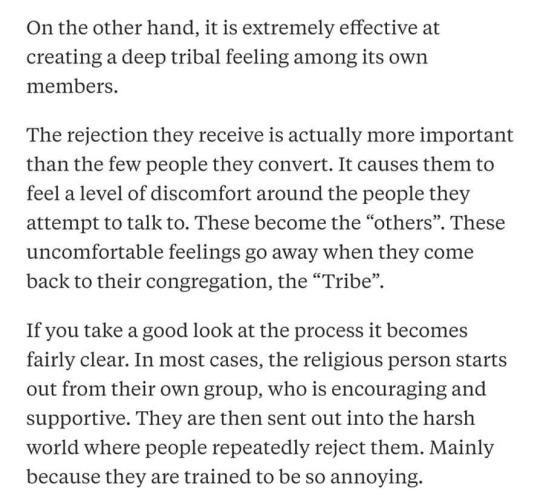
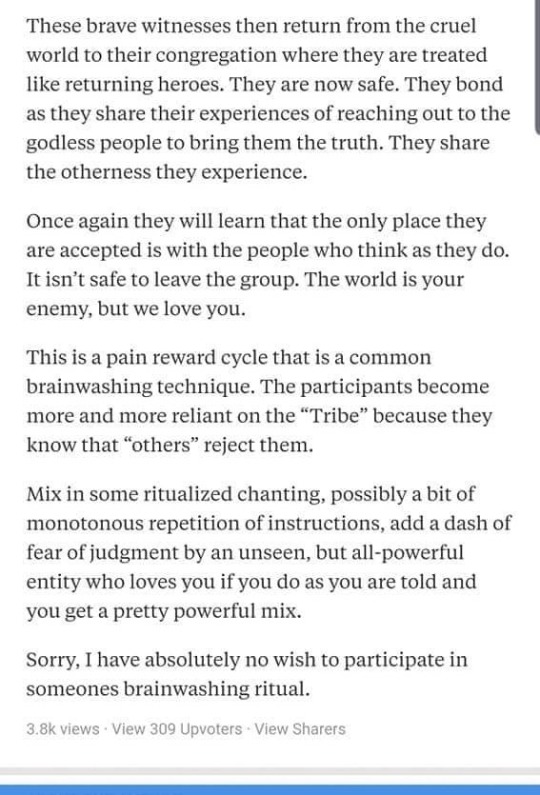
156K notes
·
View notes
